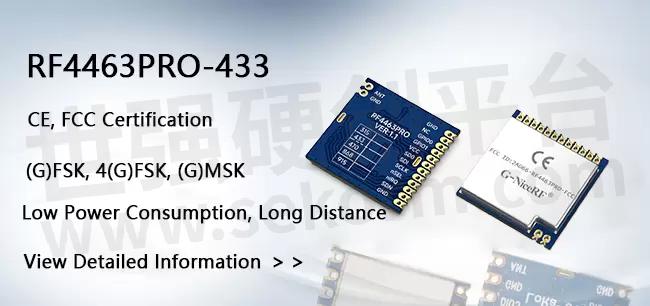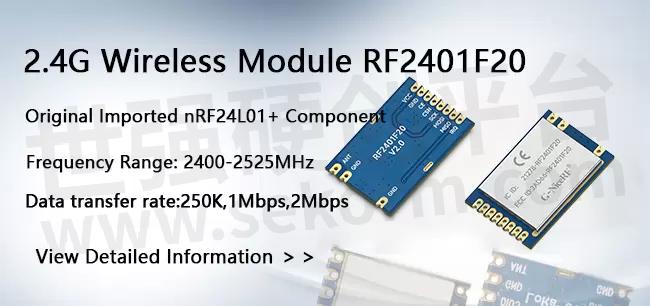Comparison of Functions and Applicability of 433MHz and 2.4GHz Wireless Modules

433MHz and 2.4GHz are two commonly used frequency bands for wireless communication modules. Today, we will introduce the characteristics of modules operating in these two frequency bands. Both the 433MHz and 2.4GHz Wireless Modules operate in the unlicensed ISM bands, making them widely used.
The 433MHz frequency band wireless modules operate within the ultra-high frequency (UHF) range, specifically within the frequency range of 433.05 to 434.79MHz. This frequency band's radio waves have longer wavelengths, excellent penetration capabilities, and can transmit over longer distances, making them suitable for low-data-rate long-distance transmissions and environments with many obstacles. Examples of devices that benefit from this include home automation, security monitoring, remote controllers, and wireless sensor networks, all requiring low-power, long-distance communication capabilities.

433MHz wireless module RF4463PRO
Si4463: A high-performance, low-power RF transceiver operating in the frequency range of 142M to 1050M, with a reception sensitivity reaching -126dBm and a transmission power up to +20dBm. It features low receive current down to 10mA and finds extensive applications in medical, smart agriculture, intelligent street lighting, and smart home sectors.
High output power: The Si4463 chip offers high output power enabling extended communication distances and broader coverage.
High sensitivity: It boasts high sensitivity reception capabilities, ensuring reliable data transmission even with weak signals.
Compatibility: The Si4463 chip supports multiple modulation schemes including GFSK and FSK, catering to diverse wireless communication needs.
Anti interference capability:Strong anti-interference capability
ensures stable communication links even in noisy electromagnetic
environments, facilitating smooth operations in complex conditions.
Air wake-up function: An important feature in the RF4463PRO series, enabling automatic device wake-up for remote monitoring and control without manual intervention.
The RF4463PRO series utilizes an industrial-grade 10PPM crystal oscillator, operating within a temperature range of -40 to +85℃. With minimal accuracy deviation, it ensures long-term stability and reliability, exhibiting excellent consistency.
The 2.4GHz band is within the super high frequency (SHF) range, serving as a globally recognized ISM frequency band with frequencies ranging from 2400 to 2525MHz. This frequency band offers shorter wavelengths, providing higher data transmission rates, but compared to 433MHz, it has weaker penetration capabilities and transmission distances.

2.4G wireless module RF2401F20
High power, long distance
RF2401F20 is a highly integrated 2.4GHz wireless ISM band transceiver chip. It features extremely low receive sensitivity (-102 dBm) and industry-leading +20 dBm output power, enabling signals to cover longer distances with stronger penetration and ensuring more stable and reliable performance.
High-speed transmission: Supports data transfer rates of up to 2Mbps, suitable for high-speed data transfer requirements.
RF2401F20 is a 2.4GHz wireless module using GFSK modulation and supporting 126 channels. It features up to 20dBm output power and high receiver sensitivity, enabling long-distance and stable wireless communication.
The
module can automatically wake up from a low-power sleep state at preset
times to complete communication tasks before returning to sleep,
thereby enhancing the device's battery.
life.
It integrates a voltage regulator internally, enabling effective
management and stabilization of input voltage to ensure reliable
operation under various power conditions.
The 2.4GHz wireless module is suitable for applications requiring large data transmission, such as audio, video streaming, and Wi-Fi. The 2.4GHz band is widely used, including for Wi-Fi, Bluetooth, and other applications.
The choice of each frequency band depends on the specific application scenario, data transmission rate, transmission distance, penetration requirements, and regulatory constraints in the region. In practical applications, selecting the most suitable frequency band according to specific needs is crucial.
In
addition to 433MHz and 2.4GHz wireless modules, NiceRF offers a variety
of wireless modules in other frequencies such as 470MHz, 868MHz, and
915MHz, utilizing different chipset solutions to diversify choices and
cater to a wider range of application scenarios. Most modules feature
multiple transmission modes, low power consumption, compact size, and
other characteristics, making them suitable for various applications. We
welcome inquiries from users for customization options.
- +1 Like
- Add to Favorites
Recommend
This document is provided by Sekorm Platform for VIP exclusive service. The copyright is owned by Sekorm. Without authorization, any medias, websites or individual are not allowed to reprint. When authorizing the reprint, the link of www.sekorm.com must be indicated.







































































































































































































































































































































































































































































































































































































































































































































































































































































































